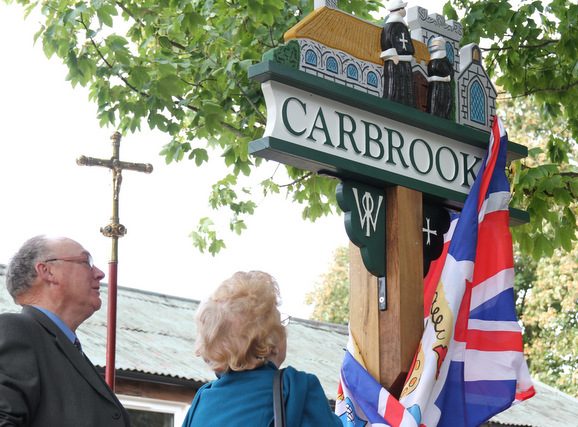Carbrooke, Norfolk is a small agricultural village, with a surprising and fascinating history, with influences through the centuries from around the world.
The aim of this website is to bring together this information. If you have any comments, information, anecdotes or photographs to share, please contact us
From the earliest reference, (The Domesday Survey) Carbrooke has been referenced as an agricultural community, which would require farms for the farmers to operate from and live in.
A building with ‘hall’ in the name is generally very old, often being an original manor house in a village. These, in earliest times would also have been farms. In Carbrooke there are three buildings with the name ‘Hall’. They are Carbrooke Hall, Wood Farm (previously called Wood Hall), and White Hall at Caudle Springs.
As the centuries passed, the original manor lands needed further outlying farms to look after the land, and so farms were built in different areas of the parish. Sometimes parcels of land were sold on, or rented out to enable smaller landowners/ tenants to operate.
In more recent times, as farming became less viable, a number of farms were sold to become private residences. This may have been due to economic depression, a result of world war one, lack of man power, mechanisation, or loss of faith in farming. As WW2 approached the MOD compulsorarily purchased acres of land in the parish to construct what became RAF Watton. When RAF Watton closed down, this land was sold for housing developments or returned to the original land owning families in early 21st century.
Following WW2 farming continued to adapt to the changes in society, farm estates consolidated, becoming fewer but larger, and employing fewer staff. Instead of many smaller independant farms dealing in a variety of crops and livestock, Carbrooke agriculture now consists of two farm estates, (perhaps returning to its original form), but the fields are larger than in the past, with crops of mainly wheat, rapeseed, or sugar beet.
A list of known Carbrooke Farms through history
Wood Farm (Wood Hall)
Wood Farm, could well be one of the oldest buildings in Carbrooke, as it was the original Manor at the time of the Domesday book. It became the farm connected with the Carbrooke Commanderie, and following the dissolution the Manor Farm late ‘of the Hospital of St John’.
1823 Sale
Notice of Sale 1823, Newspaper
1927 Wood Farm Sale Catalogue
Frontcover, Backpage, Conditions of sale Page 1, 2&3, 4&5, 6&7,
1931 Carbrooke Manor – Wood Farm; Sale Catalogue 1931
Page 1, Page 2, Page 3, Page 4, Lot 1, Lot 2, Lot 3, Lot 4, Lot 5.
King Row Farm is not strictly in Carbrooke Parish, but is on the Shipdham Road.
King Row Farm Sale Sold by autioneers Irelands. 1924
Coverpage, Page 1, Page 4 & 5, Page 6 & 7, Page 8 & 9, Page 10 & 11, Page 12 &13, Page 14 &15, Page 16 & 17, Page 18 & 19, Page 20 & 21, Horses
Church Lands Sale 1929
Page 1, Page 2, Page 3, Page 4
Turnpike Farm Sale (also known as Hall Farm), on Norwich to Watton Road and now part of Carbrooke Hall Estate.
1929 Sold by auctioneers Salter Simpson
Cover, Backcover, Page 2 & 3, Page 4 & 5, Page 6 & 7, Page 8 & 9, Page 10 &11, Horses.
North Farm
1948 Sale, on Broadmoor Road (opposite the school), and has since been sold for housing. Formerly The Jolly Farmers Pub, which closed 1912.
Mill House / Farm Caston Road – now private residence.
Red Barn Farm, Caston Road Mill House / Farm Caston Road – now private residence
Low Farm – Caston Road
Hall/ Turnpike Farm, Norwich Road.
Grove Farm ( Norwich Road?) No longer in existence.
Bullens Farm (previously Broadmoor Farm) on Broadmoor Road.Mill House / Farm Caston Road – now private residence
Broadmoor Farm – Broadmoor Road.
Southmoor Farm
Manor Farm
Fen Farm
Brakehill Farm
Oaklands Farm
Lower Farm (Farm on the Fen) No longer in existence.
Grape Farm – Ovington Road
White Hall – Caudle Springs
Caudle Springs Farm – Caudle Springs
Caudle Green Farm – Caudle Springs- part of Carbrooke Hall Estate.
Shrublands (sold for development 2021)
1861 Field Farm THOMAS Davey (Bush Farm/Toad Hall?)
Page last Updated 09.08.22
